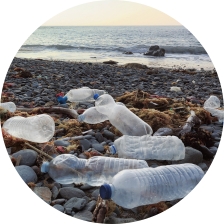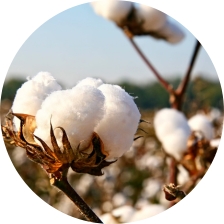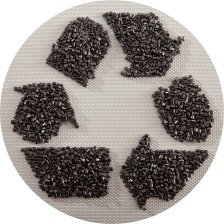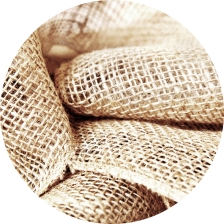Shopping Bags
Sustainable shopping bags for modern retail.
With in-person shopping on the rise, brands are rethinking their bags to better align with customer values, regulatory requirements, and sustainability goals. EcoEnclose offers customizable paper, recycled plastic, seaweed-based, and reusable shopping bags that support a better retail experience while reducing environmental impact.
-
Customizable at scale: Branding, sizes, and handle styles designed to fit a wide range of retail environments.
-
Planet-forward materials: Choose from recyclable paper, 100% recycled plastic, next-generation seaweed materials, or durable reusable options.
-
Built for today’s retail landscape: Engineered for strength, brand appeal, and compliance with local bag bans and EPR regulations.
A simple, more responsible way to deliver your brand’s values—every time a customer leaves the store.
LOW-VOLUME
Paper Bags
MOQ: 250 units for stock, 500 units for custom print
Kraft paper bags with an easy-to-fill square-bottom construction and twisted paper handles. Made from 95% post-consumer waste. Curbside recyclable at end-of-life.
Sway Die Cut Handle Bags
MOQ: 250 units for stock, 5,000 units for customization
A revolutionary alternative to traditional plastic retail bags. Made with seaweed, plants, and home compostable polymers. Translucent, durable, and easy to carry with a built-in die cut handle.
HIGH-VOLUME CUSTOMIZATION
Custom Die-Cut Handle Bags
MOQ: 100,000 units
Custom 1.5-4.0 mil plastic bags with die-cut handles. Made from 100% recycled content, 82% post-consumer waste. Thin-film recyclable at end-of-life. Brand with your design.
Custom Reusable Shopping Bags
MOQ: 5,000 units
Custom reusable open-top totes with sturdy handles. Made from ocean-bound plastic, rPET, cotton, or natural jute. Partner with us on recycling at end-of-life. Brand with your design.
Request a High-Volume Customization Quote
Guide to Retail Shopping Bags
Whether you are a D2C brand growing your base of owned brick & mortar stores or a retailer that sells a myriad of brands, we help you level up your customer experience through stock or custom shopping bags that bolster your brand, sustainability values, and the customer experience you are delivering.
Our Guide to Retail Shopping Bags is here to guide you on choosing the best shopping bag for your retail business.
What are Shopping Bags?
Shopping bags are bags designed for carrying items purchased from retail stores or supermarkets. They come in various sizes, materials, and designs, depending on their intended use and the policies of the store or region.
Common types of shopping bags include:
1. Plastic bags: These are lightweight, thin bags made from plastic materials like polyethylene. They are often provided by stores at the checkout counter for customers to carry their purchases. However, due to their environmental impact, single-use plastic bags have been banned or restricted in many places in favor of more sustainable alternatives.
2. Paper bags: These are made from paper and are often recyclable and biodegradable. Paper bags are a more eco-friendly option compared to plastic bags, and some stores offer them as an alternative to plastic bags.
3. Reusable bags: These are durable bags made from materials like cloth, jute, canvas, or other sturdy materials. Reusable bags are designed to be used multiple times, reducing the need for single-use bags and helping to minimize plastic waste.
4. Tote bags: These are a type of reusable bag characterized by their open-top design and sturdy handles. They are popular for their versatility and are often used for shopping, carrying personal items, or as promotional items.
Due to growing concerns about plastic pollution and its impact on the environment, many regions have implemented regulations or encouraged the use of reusable bags to reduce plastic waste. This has led to a shift towards more sustainable shopping bag options and a greater awareness of the need to minimize single-use plastics.
EcoEnclose offers recycled Kraft paper bags with handles and custom shopping bags including die-cut handle plastic bags and reusable tote bags.
EcoEnclose's Ship-to-Store Program
EcoEnclose has set up several unique distribution services for shopping bags and our “Ship-to-Store” has greatly benefited retailers and brands nationwide. While every program is structured based on the needs of the brand we’re working with, here’s an example of how the program can be structured.
1. Manufacture >
2. Store >
3. Order >
4. Bill >
5. Report >
6. Eco-Savings
How to Choose the Right Shopping Bags
Skip The Bag
No bag is always the optimal solution. The best environmental approach is asking customers to bring their reusable bags or carry goods without a bag. That said, this won’t always be feasible. Some customers will forget their bags. Others won’t have even planned on shopping before they make a purchase. And for some brands, the focus on luxury and customer experience may make it very challenging to expect consumers to arrive at the store with their own totes.
Reusables
Reusable shopping bags are a great solution if they are strong enough to be used 30+ times, can be easily washed if they get dirty, and you can reasonably expect that your consumers will have a reason to save and keep using them. If you choose reusable bags, remember that you want to make them durable enough to withstand this many uses and appealing in design and functionality.
One issue we will likely start running into is having too many reusable bags and throwing them out after using them only once or twice. Keep this in mind, and don’t make the mistake of inundating your customers with cheaply made, unappealing reusable bags that will likely be discarded after a few cycles.
Paper vs Plastic
If you decide on single-use bags, you will likely go with paper or plastic. Paper can be more easily recycled, while plastic has a lower carbon footprint. When exploring your options, ensure that either solution is made with 100% recycled material. This is critical for paper or plastic - learn why all paper isn’t equal and why recycled content matters.
Consider your sustainability values, brand values, and customer preferences as you decide between the two. If you are a low-cost retailer, 100% recycled plastic shopping bags may be best. If plastic-free is core to your ethos, go with paper.
If you go with plastic, remember to keep the bags thick enough that they don’t pose a major hazard of becoming litter or marine plastic pollution. A 1 mil bag like a cheapand flimsy plastic grocery bag is lightweight, flies away easily, and is much more likely to become litter than a 2.5-3 mil bag. Thick plastic is easily reused multiple times, minimizing its carbon footprint.
Navigating Plastic Bag Bans and Single-Use Bag Bans
Alongside this, many states have banned plastic bag bans from their cities.
In addressing these bans with your strategy, it is best to take a different approach for different stores. You may use 100% recycled LDPE die-cut handle bags for some stores. For others, you may use 100% recycled paper bags. And for others, you might have no single-use bags but will offer reusable totes for sale. EcoEnclose can help you navigate these laws and set up a platform for your store managers to ensure they can only order and receive retail bags that align with their region’s legislation.
How to Choose a Sustainable Fabric




rPET:
rPET stands for "recycled polyethylene terephthalate." It is a type of plastic that is made from recycled PET materials. PET is a common type of plastic used in various applications, including beverage bottles, food containers, and clothing fibers.
The recycling process involves collecting and sorting used PET products, and then processing them into small pellets to create rPET. These pellets can then be used to manufacture new products, just like virgin PET.
rPET is commonly used to create new bottles, containers, and packaging materials such as reusable totes, reducing the environmental impact of synthetic materials and fibers.
Ocean-Bound Plastic:
Ocean-bound plastic refers to plastic waste at risk of entering the ocean but has not yet done so. It includes plastic materials found in coastal areas, along shorelines, rivers, and other waterways connected to the ocean. This plastic waste is susceptible to being carried by wind, rain, and water currents, which can eventually transport it into the ocean if not correctly managed.
Utilizing ocean-bound plastic has the immediate impact of helping to prevent materials from entering the ocean. An added and more systematic, long-lasting impact is that these purchases help fund plastic collection and recycling infrastructure in under-resourced communities worldwide that suffer from excessive waste and litter.
Once collected and remanufactured into rPET, this material looks, feels, and behaves like standard rPET.
Jute:
Jute fabric comes from the long, soft, and shiny fiber made from the cellulose and lignin material from the jute plant. While there are several species, most Jute fabric is made from Corchorus capsularis (white jute).
Once processed, Jute fiber is used to make rope, bags, carpets, and much more. 90% of the world’s jute comes from Bangladesh, with India as the second largest producer of the fabric.
Consider for reusable totes, but avoid when weatherproofing and washing are critical.
Cotton:
Cotton is the most widely produced natural fiber on the planet and is derived from the seed coat or the outer layer of the cotton plant's seeds. These cotton seeds must first be separated from the plant. Then the fibers must be separated from the seeds. Each seed may have as many as 20,000 fibers. Once harvested, these fibers are cleaned and spun into yarn that is woven and dyed into the durable fabric we know.
Reusable packaging rarely requires the functional benefits of cotton and there are better materials available. If cotton is absolutely necessary, be sure to select Recycled or Certified Organic Cotton. If Regenerative Cotton is available, select this.
EcoEnclose's Reusable Tote Take-Back Program
Frequently Asked Questions
What types of shopping bags does EcoEnclose offer?
We offer paper, recycled plastic, and reusable shopping bags—each designed for sustainability, durability, and customization.
Are EcoEnclose paper shopping bags recyclable?
Yes. Our paper bags are made from recycled and renewable fibers and can be recycled curbside after use.
Are EcoEnclose plastic shopping bags eco-friendly?
Yes. Our plastic shopping bags are made from 100% recycled content and are recyclable through in-store drop-off programs or our own Take Back Program.
What makes reusable bags a sustainable choice?
Reusable bags reduce waste and resource use by replacing single-use bags. EcoEnclose reusable options are made with durable, washable materials designed for repeated use.
Can I customize shopping bags with my brand’s logo?
Absolutely. We offer full-color printing and size customization to align with your brand’s identity and retail requirements.
Get a custom quote for customization capabilities for our other products and high-volume customization capabilities for shopping bags.
Do your bags comply with local or state bag regulations?
Yes. Our team helps ensure your packaging meets bag-ban laws and retail regulations, whether for paper thickness, recycled content, or labeling requirements.
What’s the most sustainable shopping bag option?
It depends on your business and region. Paper bags are best for curbside recycling, while reusable bags have the lowest long-term environmental footprint. Contact us to learn more and find the best solution for your business.
Can EcoEnclose handle large-scale distribution to retail locations?
Yes. We provide fulfillment and logistics support to distribute your customized shopping bags across multiple storefronts or warehouses. Get a custom quote to understand your options.
Are your shopping bags made in the USA?
Yes. Most of our paper and reusable shopping bags are manufactured domestically, supporting local production and reducing transport emissions.
Does EcoEnclose have a recycling or take-back program?
Yes. Our Take Back Program allows customers to return used plastic bags and other packaging for proper recycling and circularity.




